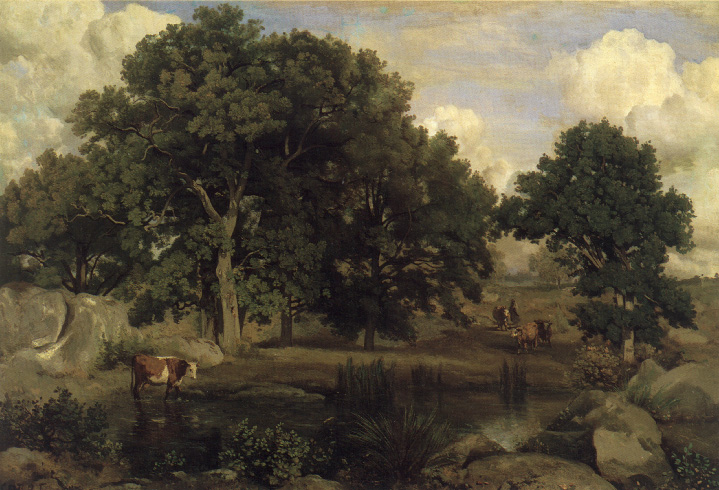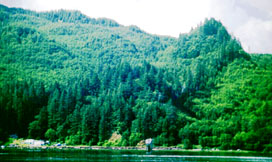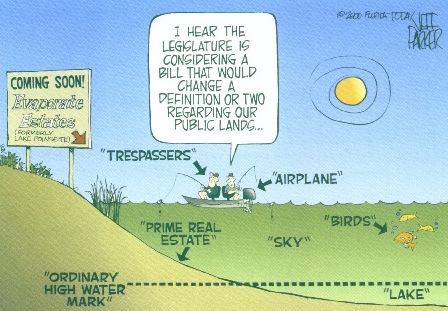
Country,
countryside, A Taste for Country
A “supplemental guide to economic relations”

Aldo Leopold, 19th and 20th
century, wildlife biologist, conservationist,
ecologist.
![]()
![]()
![]()
Country has more to the concept than just the imagery of creeks, fields and streams.
For most people the word country evokes and image of landscape features that are synonymous with land. But taking our lead from Leopold you can become aware that we are not only losing countryside, we may be losing our taste for interpreting our surroundings, because we have lost some of the vocabulary that informs people about what they see.
American poet, Richard Wilbur argues that we no longer use terms such as dell, or swale, coomb, or knoll for the precise descriptive features they once described for rural inhabitants of regions with such geographical features. That is instead of knowing that a piece of high ground was formed by a glacier and is called a tarn, we don't recognize the feature's full importance as a clue to the present as it emerged out of the past.

Himalayan deforestation is due, in part, to poverty. Eurpean land use keeping forested woodland acres.
Literally | Figuratively | his argument | Weal
A Sand County Almanac
Almanacs track a sense of time as Journals track a sense of existing in time
Land pyramid reveals a sense of dynamism
Round River as a means of explaining ecological cycles
Ecology as the science of place
• ecological conscience for a moral compass
• wisdom of biotic navigation
His argument
A Taste for Country
In eight paragraphs [¶] Leopold redefines terms we usually take for granted as having a similar meaning.
Paragraphs terms meanings confusion between land and country unapparent quality "A conspicuous quality of physical endowment" remote lakeshore "quietudes that lie below the dunes." lean poor land "but rich country" wildlife's presence determines the quality of country "here is a place" sensing a whole chain of other sequences "diversity in aesthetic competence" scenic places "drab sogginess" "exterior often conceals riches" The essay defines conservation, a conservation aesthetic based on a cultivated taste for natural features.
His land ethic essay focuses on the time and place of ecologically essential events, and a behavioral guide on how to further an ecological ethic as the precondition for successful, effective and equitable conservation.
• Defines and adopts
an ecological view of history
“enlarges the boundaries of the community to include soils waters, plants
and animals, or collectively: the land.”
p. 239.
• Describes a new approach to conservation in the § on “A | B Cleavage” ,
p. 258.
In the use of natural features, resources, and places Aldo Leopold distinguishes
1) commodity production view
2) biotic wealth preservation account approaches:
a) autistic
b) biophiliacs
Two different types of investment decisions
1) future value of a forest diminishes with high interest rates.
2) common property, keystone elements in ecological management.
Logging in
Washington State 
Land emerges as a collective organism with needs, best interpreted as a collection of parts. The concepts of Weal & Laws of conservation, minimum, ecology explain the parts and how these parts function.
Weal as source of wealth
E
W water redemption rivers & streams = watershed
E energy eternal delight sources of useful power
A atmosphere surrounding climate
L landscape vegetation, wildlife & fisheries
Land air and water are a circuit
landscape and vegetation air and atmosphere the hydrological cycle: rain, fog, surface and ground flows
Weal and Law reflect a hidden quality of country characterized by:
dynamic feed-back
spiral that loops back upon itself in a self-renewing
process of becoming alive.“health is the capacity of the land for self renewal.” p. 258.
dynamism functional relations rely on limiting factors
The many meanings of Aldo Leopold’s, “Land Ethic”
natural objects as indicators, circuit breakers, enunciators; emerge as symbols -- tree branches, tributary streams, cycles that are manifest in abundant wildlife & fisheries.
NATURE intrinsic value
inherent behavior
what is a natural area worth?
In the Land Ethic Leopold suggests these seven virtues of healthy country:
- a misplaced trust in science p. 241
- having ecological (cancer)
- answers “member of a biotic team” p. 241
- plant succession -- history p. 243
- “extension of ethics” p. 238
- community concept p. 239
- predator prey relations to sustain top level predators

Country as both vegetation and watershed possess capacities for self renewal and keystone species
- a partner can we become members of the biological community as equal citizens?
- dynamic dancing adaptive learning, negating functionality
- An “intense consciousness of land” (p.243, quoted from 251, 253 “fountain” )
- “violence, rapidity and scope” (p. 254) of man-made changes!
- “wisdom of biotic navigation” from The Round River, p. 189
- “history and ecology ... contrive to limit her density.” (land due to water and energy)
That in the beauty of the natural world is the stability and permanence of existence; inalterable, inalienable, irretrievable, “it is the world that created” and maintains us!
We must, if the land ethic is ever to be demonstrable, see -- feel -- understand -- love, respect and admiration -- have faith in the land organism: LO.
the mere thin edge of the LO is seen merely as landscapes.
“the natural world is beyond our vision of it.”Rachel Carson, J.B.S. Haldane
if we are ever to save it. a land ethic a precondition for conserving!
“Conservation is a state of harmony between men and land.”
“the exhaustion of wilderness in the more habitable portions of the globe.” 264
“That man-made changes are of a different order ( magnitude) than evolutionary changes, and have effects (population) more comprehensive than is intended or foreseen.”255
Components of outdoor recreation
Wilderness Attributes physical objects
feeling of isolation
fresh/ change of scene
perception of nature
husbandry (stewardship)
Explanation of the components of outdoor recreation
by Aldo Leopold
(1947)“…each is considering a different component of the recreational process. These components differ widely in their characteristics or properties .” A given policy may be true for one but false for another.” [284]
“It is timely, therefore, to segregate the components, and to examine the distinctive properties of each.”
1. “the physical objects that the outdoorsman may seek, find, capture and carry away. In this category are wild crops such as game and fish, and the symbols or tokens of achievement such as heads, hides, photographs and specimens.…the idea of trophy” [284]
2. “… another component of recreation, which is more subtle and complex: the feeling of isolation in nature. [288-289]
3. “We now contrast with the isolation component that very distinct and simple one which we may label ‘fresh-air and change of scene.’” [290]
4. “We now come to another component: the perception of the natural processes by which the land and the living things upon it have achieved their characteristic forms (evolution) and by which they maintain their existence (ecology).” [290]
5. “There is, lastly, a fifth component: the sense of husbandry.” [292]
“Recreational development is a job not of building roads into lovely country, but of building receptivity into the still unlovely human mind.” [295]
Last Updated on September 21, 2005 By Joseph Siry schedule | Courses | Atlas | site-map | Ecology | laws | quick look Science Index | Site Analysis | Population Index | Global Warming Index | Nature Index | Research sites | Genes Terms | Glossary | Word webs | Basic vocabulary | Advanced Vocabulary | Antonyms | Synonyms Writing | Interviews | Free Writing Photo-home | Site guide | Overview writing
Learning Grading